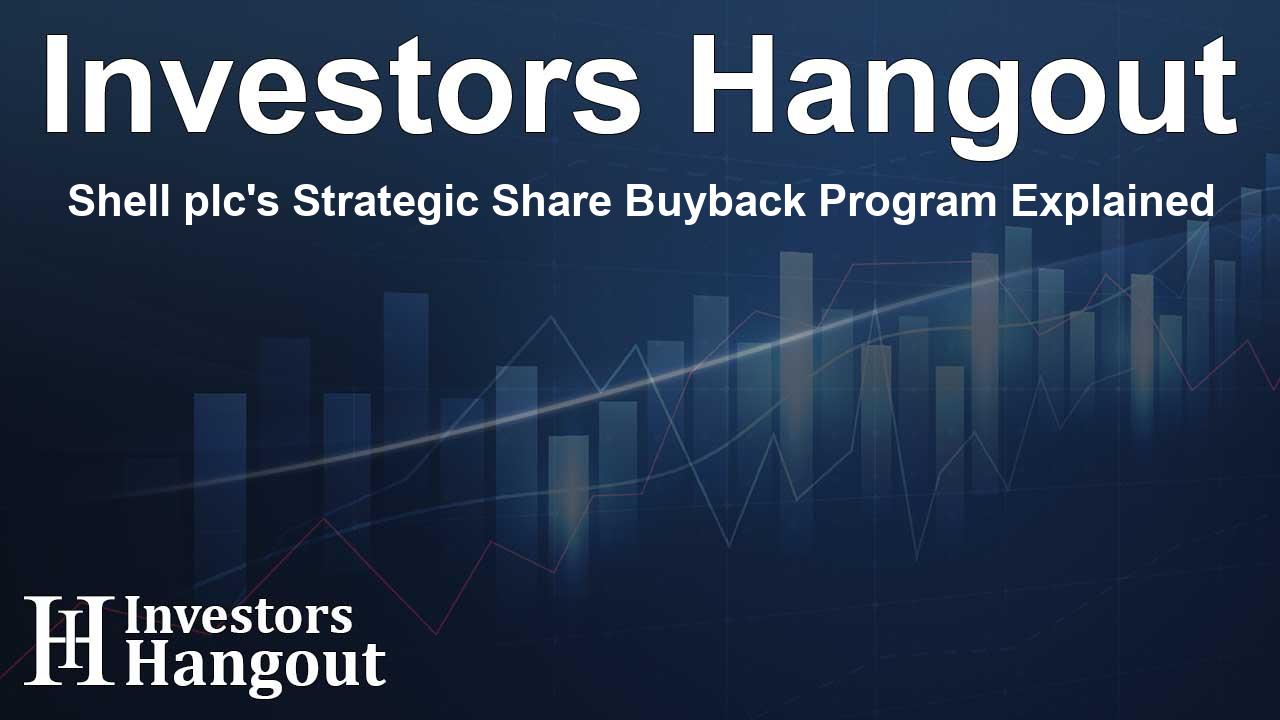Shell plc's Strategic Share Buyback Program Explained

Shell plc's Commitment to Shareholder Value
Shell plc is taking significant steps to enhance shareholder value through their recent share buyback program. The initiative, aimed at purchasing back shares from the market, aligns with the company’s commitment to return capital to its shareholders while simultaneously optimizing its capital structure.
Details of the Share Purchase Transactions
On a recent trading day, Shell plc executed a series of share buybacks across various trading venues. Here’s a summary of the shares that were bought back:
Summary of Recent Transactions
On this particular day, several transactions occurred totaling up to:
- 450,000 shares purchased at an average price of £23.7615.
- An additional 100,000 shares purchased in another venue at a price of approximately £23.8165.
- The buybacks also included transactions for 350,000 shares in the Euro market, ensuring broad coverage across regions, with prices varying in response to the market dynamics.
Understanding the Buyback Program Structure
The execution of these transactions is framed within a broader buyback initiative first announced in early 2025. The buyback plan is not simply reactive but is driven by strategic foresight, where the company has enlisted Natixis to make independent trading decisions.
The buyback program operates under carefully established parameters which include limits on price and quantity, ensuring that operations are conducted efficiently and within regulatory stipulations. It serves not only to strengthen the share price but also to signal confidence in the company's long-term prospects.
Mechanism of Implementation
The buybacks are conducted in two primary ways: on-market and off-market actions. Within the on-market scope, Shell respects the regulations and guidelines set forth concerning stock repurchase activities, making purchases that fit within their authorized framework.
Conversely, the off-market purchases are arranged through specific contracts that have been approved by shareholders. This method provides the flexibility needed for fulfilling share repurchase objectives without causing disruptive market movements.
Compliance with Market Regulations
Shell’s buyback program is firmly aligned with the necessary regulations, including both UK MAR and EU MAR standards. This regulatory compliance ensures that the program maintains transparency and fairness to all investors in the market.
These regulations stipulate that detailed records of all individual trades made during the buyback activities be maintained and disclosed, reflecting the company’s commitment to adhere to high standards of corporate governance.
Impacts on Shareholder Investments
For investors, such buybacks can lead to an increase in earnings per share, as the cumulative profit of the company is spread over fewer shares. This decrease in the available share count can often result in appreciation of share value, which is a positive outcome for shareholders.
Final Thoughts on Shell plc’s Conducive Growth Strategy
Shell plc’s approach to share buybacks exemplifies a robust strategy for returning value to shareholders while also sending a strong message about the company’s ongoing growth potential. With a clear plan in place, investors can have confidence in Shell’s commitment to enhancing shareholder value alongside its operational goals.
Frequently Asked Questions
What is the purpose of Shell plc's share buyback program?
The buyback program is aimed at increasing shareholder value by reducing the number of shares in circulation, thereby enhancing earnings per share.
Who makes the trading decisions for Shell's buyback?
Natixis is responsible for making trading decisions on behalf of Shell, allowing for independent and strategic execution of the buyback plan.
What are the benefits of share buybacks for investors?
Share buybacks can lead to an increase in share price and earnings per share, which can be beneficial for investors looking for capital appreciation.
How does Shell ensure regulatory compliance during buybacks?
Shell adheres to both UK MAR and EU MAR regulations, maintaining transparency and providing detailed breakdowns of buyback trades to comply with market rules.
What are the implications of the buybacks on Shell's financial strategy?
The buybacks support Shell's broader financial strategy of returning capital to shareholders while maintaining a strong market presence and optimizing its investment resources.
About The Author
Contact Riley Hayes privately here. Or send an email with ATTN: Riley Hayes as the subject to contact@investorshangout.com.
About Investors Hangout
Investors Hangout is a leading online stock forum for financial discussion and learning, offering a wide range of free tools and resources. It draws in traders of all levels, who exchange market knowledge, investigate trading tactics, and keep an eye on industry developments in real time. Featuring financial articles, stock message boards, quotes, charts, company profiles, and live news updates. Through cooperative learning and a wealth of informational resources, it helps users from novices creating their first portfolios to experts honing their techniques. Join Investors Hangout today: https://investorshangout.com/
The content of this article is based on factual, publicly available information and does not represent legal, financial, or investment advice. Investors Hangout does not offer financial advice, and the author is not a licensed financial advisor. Consult a qualified advisor before making any financial or investment decisions based on this article. This article should not be considered advice to purchase, sell, or hold any securities or other investments. If any of the material provided here is inaccurate, please contact us for corrections.
